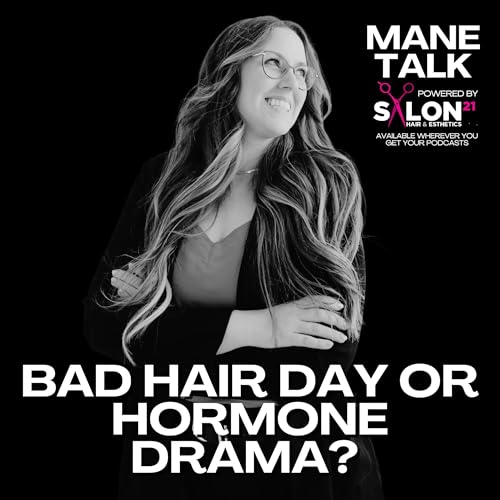
Bad Hair Day or Hormone Drama? A Stylist’s Guide to What’s Really Going On
Failed to add items
Add to basket failed.
Add to Wish List failed.
Remove from Wish List failed.
Follow podcast failed
Unfollow podcast failed
-
Narrated by:
-
By:
About this listen
Hormones—the drama queens of the body—are crashing the hair party, and host Laura Bell is here to break it down. From puberty to postpartum, thyroid shifts to perimenopause, this episode of Mane Talk unpacks how your internal world affects the hair on your head (and sometimes your chin). Laura shares laugh-out-loud stories from behind the chair (including the time a surprise pregnancy was revealed by a box of foils) and delivers practical, supportive advice for navigating hormone-related hair changes. If your texture’s gone rogue, your color’s not holding, or your strands seem to be staging a rebellion, this one’s for you.
Timestamps:
0:00 — Introduction & Welcome
0:38 — Recap of Last Episode & Today’s Topic: Hormones
0:59 — How Hormones Affect Hair
1:21 — Hormonal Shifts: Puberty
1:51 — Puberty’s Impact on Hair
2:15 — Early Hair Experiments & Advice for Teens
2:40 — Thyroid Imbalances & Hair
3:04 — Stress, Birth Control, and Hair Changes
3:28 — Postpartum Hair Loss
4:20 — Pregnancy, Color Changes, and Real Client Stories
5:00 — Stress & Hair Loss
5:23 — PCOS, Perimenopause, Menopause & Hair
7:32 — What You Can Do: Tips & Advice
8:21 — Final Thoughts: Be Kind to Yourself & Your Hair
9:08 — Outro & Where to Find More
Notable Quotes:
- “Hormones: they show up uninvited, ruin your plans, and then pretend they did nothing wrong.”
- “Your MD should handle the hormones—I’ll handle the hairline.”
- “Your hair’s not mad—it’s just hormonal, confused, and in desperate need of a snack and a nap.”
- “We’re part stylist, part therapist, part magician, and we’ve got eyes sharper than your tweezers.”
- “Don’t stress. That doesn’t mean it’s ruined—it just means you’re human.”
Key Takeaways & Resources:
- Puberty can bring oily roots, texture changes, and scalp issues. Be patient and go gentle.
- Thyroid imbalances can cause thinning and dryness—if you’re seeing changes, talk to your doctor.
- Birth control changes often lead to oiliness, hair loss at the temples, or texture shifts.
- Postpartum hair loss (aka telogen effluvium) usually peaks around 4 months and normalizes by 1 year.
- Pregnancy hormones can alter how hair color lifts—sometimes drastically.
- Stress raises cortisol, which disrupts growth cycles. Effects often show up 12 weeks after the event.
- PCOS, Perimenopause, and Menopause can cause both excess hair and thinning due to hormonal imbalances.
🔹 Laura’s Pro Tips:
- Track your timeline and note any lifestyle or health shifts.
- Avoid tight hairstyles, over-brushing, or harsh treatments.
- Try scalp serums, gentle massage, and consult a pro for personalized care.
- Talk to your stylist! Hair is personal, and they’re here to help, not judge.
🔗 Follow Salon 21 for More:
🌐 Website: salon21.ca
📸 Instagram: @salon21hairandesthetics
📘 Facebook: Salon 21 by Laura Mills


